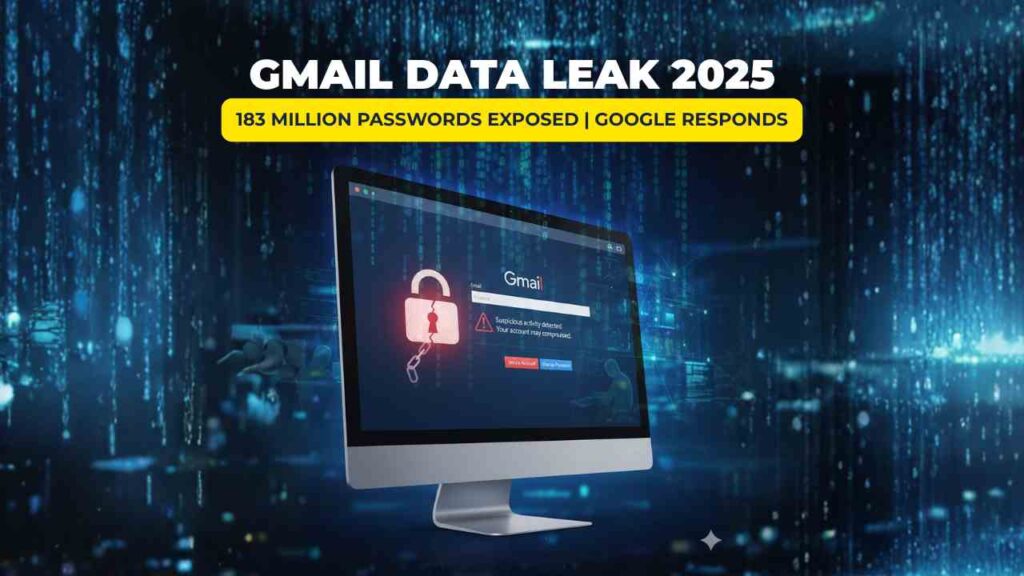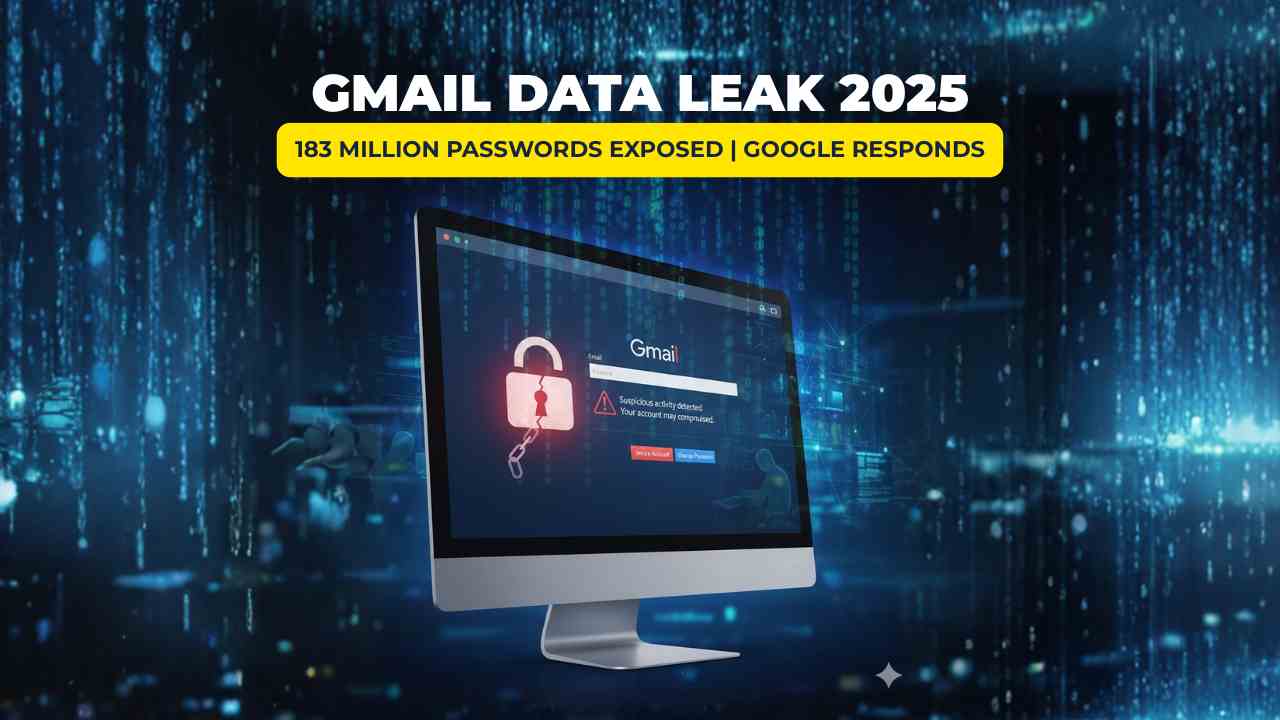1. What Happened in the Alleged Gmail Data Leak?
In late October 2025, reports surfaced claiming that over 183 million email credentials had been exposed on a hacker forum. The database allegedly included millions of Gmail accounts, sparking global concern among users about the security of their personal information.
According to multiple reports (Economic Times, NY Post, NDTV), cybersecurity researchers found that the leaked data included email addresses and passwords that might have been obtained through infostealer malware rather than a direct Google server breach.

2. Google’s Official Response
Google strongly denied the claims of a massive Gmail data breach. In an official statement, the company clarified that its systems had not been compromised.
“We found no evidence of a security breach in our systems. The leaked information appears to be a collection of old credentials obtained from malware-infected devices,” a Google spokesperson said.
The tech giant emphasized that users’ Gmail accounts remain secure as long as they use strong passwords and enable two-step verification (2FA).
3. What Is the Gmail Infostealer Malware?
The so-called Gmail infostealer malware refers to malicious software designed to steal saved login details from infected devices. It targets browsers and password managers, collecting usernames and passwords stored locally.
| Key Point | Details |
|---|---|
| Type | Credential-stealing malware |
| Target | Email and browser-stored passwords |
| Impact | Exposes login credentials on dark web forums |
| Prevention | Use antivirus, update software, avoid suspicious links |
In essence, this wasn’t a Gmail system hack, but a user-device-level compromise affecting individuals with weak security hygiene.
Also Read: 2025 में Gmail का Password कैसे Change और Reset करे?| Gmail New Password कैसे बनाए?
4. How to Check If Your Gmail Account Was Affected
If you’re worried that your Gmail login details might be part of the 183 million leaked credentials, there’s an easy way to check.
Use these two trusted websites that track and report known data breaches:
🔹 Firefox Monitor – Another reliable website that checks whether your email has been exposed in past data breaches.
🔹 Have I Been Pwned – A free tool where you can safely enter your email address to find out if it has appeared in any leaked databases.
Here’s what to do:
- Visit either of the websites above.
- Type in your Gmail address and click “Check.”
- If your email appears in the results, it means your credentials were found in a leak.
In that case, immediately change your Gmail password and turn on two-step verification (2FA) to secure your account against unauthorized access.
Simply enter your email address to see if it appears in any leaked database. If it does, change your password immediately and enable 2-step verification.
5. How to Protect Your Gmail Account from Future Breaches
Here are Google-recommended security practices to keep your Gmail account safe:
- Enable 2-Step Verification (2FA) – Adds an extra layer of protection.
- Use Strong, Unique Passwords – Avoid reusing the same password across multiple accounts.
- Run Google Security Checkup – Visit Google’s Security Checkup to review account safety.
- Avoid Phishing Links – Never click unknown links or download attachments from suspicious emails.
- Keep Devices Updated – Regular updates fix vulnerabilities that hackers can exploit.
6. Expert Opinion: Data Breach or Data Dump?
Cybersecurity analysts suggest this leak is a compilation of old data gathered from multiple smaller breaches and malware infections, not a single new Gmail breach.
Google’s prompt clarification aligns with the fact that credential dumps often resurface online to cause panic or sell stolen data. Therefore, while the leak is real, Gmail’s servers remain uncompromised.
Also Read:
- Meta Layoffs 2025: Why Meta Cut 600 Jobs from Its AI Division and What It Means for the Future of Superintelligence
- Google Cloud CEO Thomas Kurian Says: “AI Will Amplify Human Potential, Not Replace Tech Jobs”
- Honor Robot Phone: A Futuristic Leap in Smartphone Camera Technology
Frequently Asked Questions (FAQs)
Q1. Was Gmail hacked in 2025?
No. Google confirmed there was no breach in its systems. The leaked data came from malware-infected devices, not from Gmail servers.
Q2. How can I check if my Gmail was affected?
Visit HaveIBeenPwned.com and enter your email address to check for exposure.
Q3. Should I change my Gmail password?
Yes, it’s always wise to update your password if your email appears in any leak or if you use the same password elsewhere.
Q4. What’s the best way to secure Gmail?
Enable 2-step verification, use strong unique passwords, and avoid phishing attempts.
Q5. Is my personal data safe with Google?
Yes, Google’s security systems are robust and continuously monitored. However, users must also practice personal cybersecurity hygiene.
Disclaimer:
The information in this article is based on reports from reputable media outlets and Google’s official statements. While efforts have been made to ensure accuracy, readers are advised to verify details from Google’s official sources before taking action.
Sources:
Hi, I’m Simran Shah, a graphic designer and digital content creator with 4+ years of experience. I run two YouTube channels focused on AI, tech, mobiles, and automobiles — topics I’m truly passionate about.
My love for deep research started when I used to spend hours finding the best gadgets or information before making any decision. That’s when I realized I could help others save time by sharing my findings — both through well-researched content and visually compelling designs.
Now, through blogs, videos, and graphics, I do the research so you don’t have to — using tools like ChatGPT to make content clear, helpful, and time-saving.

